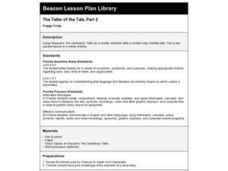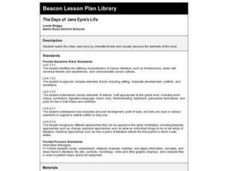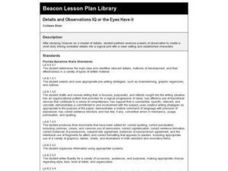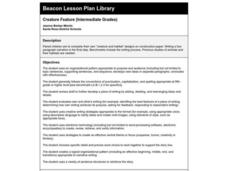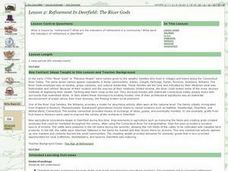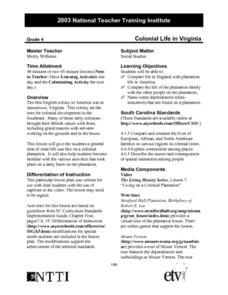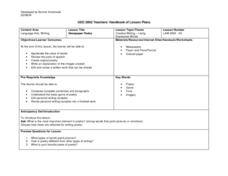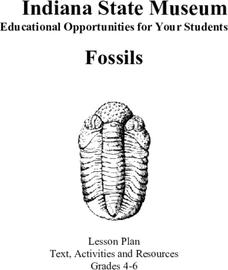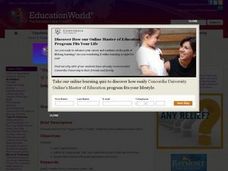Curated OER
The Teller of the Tale, Part 3
Students practice use of volume, stress, pacing, enunciation, eye contact, and gestures needed to meet the needs of the audience when presenting their own tales based on Chaucer. They receive teacher and student feedback and prepare to...
Curated OER
The Teller of the Tale, Part 2
Students discuss character types and their qualities. They select two characters and write about their dress, speech, habits, attitudes and beliefs. They write a monologue as the characters presenting a moral theme.
Curated OER
The Days of Jane Eyre's Life
High schoolers watch the movie Jane Eyre and complete a viewing log. They take a test on their findings.
Curated OER
Strong Verb Image Makers
Students use description language to clarify ideas and create vivid images in an essay focusing of strong verbs. They discuss weak verbs and explore that the better image the words create, the better the reader understands the text.
Curated OER
Product Persuasion
Students examine various products and analyze the marketing strategies used to entice consumers. They bring in a product they like to use, and using persuasive writing, they write their own advertisements for their products.
Curated OER
Newsworthy Fairy Tales
Third graders review common fairy tales and work in teams to rewrite the fairy tales as news articles. They answer questions using the 5 Ws (who, what, where, when, why). Student articles include eye-catching headlines.
Curated OER
I'm Convinced!
Students examine persuasive techniques used to sell products, and create and write an advertisement for peanut butter.
Curated OER
Details and Observations IQ or the Eyes Have it
Fourth graders study Chaucer as a master of details. Then, they create a short story linking unrelated details into a logical plot with a clear setting and established characters. This instructional activity has some excellent worksheets...
Curated OER
Delicious Words
Fifth graders work together to make simple menus more interesting by adding descriptive words. This plan works well with the Six Traits of Writing as it covers the trait of word choice. This is a really fun way for students to practice...
Curated OER
Creature Feature
Students work in pairs to create a creature and its habitat out of construction paper. Then students write a narrative to describe the animal and its habitat.
Curated OER
Refinement in Deerfield: The River Gods
Students research the town of Deerfield, CT and its River God families to show how the middle class developed in the Connecticut River Valley.
Curated OER
Here's the Pitch
Students define pitch, measure varying amounts of water into containers, make predictions about the sounds made when striking the containers, put containers in order from highest to lowest pitch, and create their own sound patterns with...
Curated OER
E-tiquette
Students develop appropriate ways to communicate via e-mail. They evaluate examples of inappropriate e-mails and create preferable alternatives.
Curated OER
Printmaking for Grades 6-8
Students create a relief print. The chosen image for this print be a setting from a novel that played an important role in the plot of the story. They conclude this lesson by writing a literature response about their setting.
Curated OER
Witches and Wizards Ceramic Marionettes
Students brainstorm and illustrate different types of costumes and characters. After a lecture/demo, students choose their favorite character and create a ceramic marionette.
Curated OER
Activating Students
Students view and analyze one example of student activism in the 1960's and then apply their learning to their own situations. They work cooperatively to develop and implement their own "activist" or community service learning plan.
Curated OER
The Shakespeare Crowd
Students study the life and times of Shakespeare. They read and analyze one of his plays and use the Internet and videos to gain an understanding of how Shakespeare engaged his audiences, then and still today.
Curated OER
Colonial Life in Virginia
Fourth graders compare and contrast life in England with plantation life in America. They study the dependencies or mini-industries that could be found on plantations.
Curated OER
Newspaper Poetry
Young scholars cut out nouns, verbs, adjectives, and adverbs from newspapers and create poems using words they have found.
Curated OER
Slang and Dialogue in Bud Not Buddy
Students identify the 1930's slang in the novel, Bud, Not Buddy. They compare it to modern slang and rewrite a section of the book using modern slang instead of 1930's slang.
Curated OER
That's My Line
Students work together to brainstorm dialogues intended to persuade another person to engage in a sexual activity. They supply creative and persuasive refusals to these requests.
Curated OER
Fossils
Students complete a unit on fossils. They read and discuss informational handouts, define key vocabulary terms, answer discussion questions, create a geologic timeline and a timeline of their own life, analyze bones, and create a fossil...
Curated OER
"Giggle Poetry" Theater
Students read and perform "Giggle Poetry Theater." In small groups, they read the poems, collect props, rehearse, and present their poem to their classmates.
Other popular searches
- Chinese Tones
- Language Tones
- Non Chord Tones
- Different Author Tones
- Tints Tones Shades
- Co Lour Tones
- Voice Tones
- Tones in Writing
- Ring Tones
- Acceptable Voice Tones
- Four Tones
- Tones and Semitones



